Vocational Nurse
As the Baby Boomer population continues to age, the demand for health care services is projected to rise. Also, due to federal health insurance reform, the number of people with access to health insurance is expected to increase as well. All of this means there are more opportunities for careers in the health care industry than ever.
Find out how Glendale Career College can help equip you to become a Vocational Nurse and start working alongside doctors, registered nurses, and other health care professionals in a medical clinic, doctor’s office, hospital, or other health care facility.
Enroll at any of our campus locations in Glendale, San Diego, Near Burbank, Pasadena, Hollywood, Bakersfiled, West Covina, Los Angeles (LA) & other California (CA) communities!
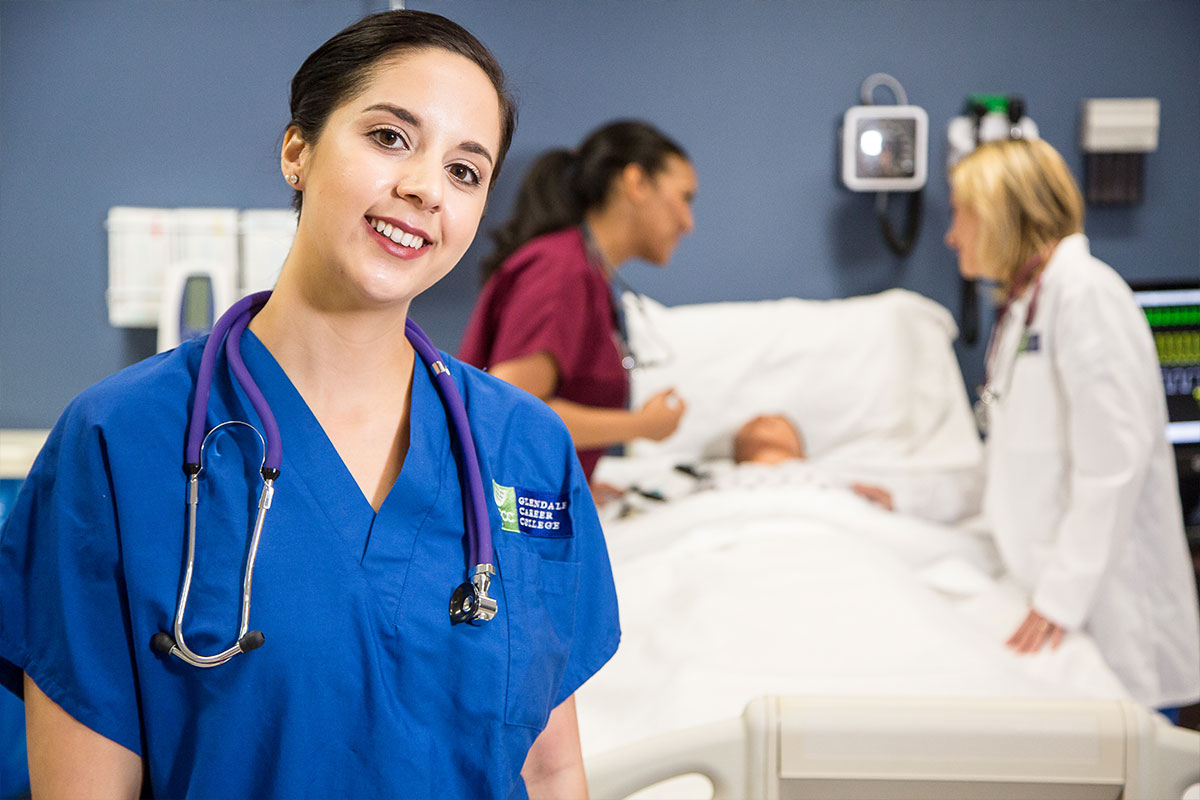
Vocational Nurse
Vocational Nurse Overview
Licensed Vocational Nurses (LVNs) and Licensed Practical Nurses (LPNs) provide hands-on patient care under the direction of a Registered Nurse or a licensed doctor. Vocational Nurses offer individual- and family-centered nursing care, and help determine the basic physical, emotional, spiritual, and sociocultural needs of the patient.
Vocational Nursing professionals work in a number of health care settings, including hospitals, skilled nursing facilities, doctors’ offices, medical clinics, correctional facilities, and home health care agencies.
Vocational Nurses regularly perform a number of crucial tasks, including:
The Vocational Nursing program at Glendale Career College can equip you with the health care knowledge and skills needed to start a career as a Vocational Nurse working in a medical office, clinic, physician’s office, HMO, rehabilitation center, hospital, or other health care facility.
Professional Licensure Disclosure
The Vocational Nurse program at Glendale Career College meets the education requirements for a program of study intended to lead to licensure as a Licensed Vocational Nurse in the State of California.
The State of California requires that an applicant for a Licensed Vocational Nurse professional licensure complete a nursing program that includes 1,530-clock hours at an institution approved by the California Board of Vocational Nursing and Psychiatric Technicians (BVNPT).
Glendale Career College is approved by the California BVNPT and the College’s Vocational Nurse program exceeds the 1,530-clock hour requirement. After successfully completing the College’s Vocational Nurse program, the student must also pass the NCLEX-PN exam offered by the National Council of State Boards of Nursing, Inc. in order to become a Licensed Vocational Nurse.
You can view NCLEX-PN pass rates here:
Glendale Career College has not made a determination as to whether the College’s Vocational Nurse program meets the Licensed Vocational Nurse professional licensure requirements of any other state.
* Bureau of Labor Statistics, U.S. Department of Labor, Occupational Outlook Handbook, Licensed Practical and Licensed Vocational Nurses, found at https://www.bls.gov/ooh/healthcare/licensed-practical-and-licensed-vocational-nurses.htm (visited June 2020).
GCC is not able to guarantee employment.
Proudly accredited, licensed to operate and/or recognized by the following institutions:

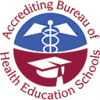


Many programs feature Online lectures and classes combined with hands-on in-person lab training.
Enroll in the Vocational Nurse program at the following campuses:
Explore our other nursing and health care career training programs at our campuses in Bakersfield, San Diego and Glendale, California near Los Angeles, Burbank, Hollywood and Pasadena
Meet a Graduate
Questions?
Let us help you launch your career by contacting us today. Simply fill out our contact form or call us at 800-639-3384.
Classes are starting soon!
Vocational Nurse Careers & Work Environment
The Vocational Nursing program at Glendale Career College offers the education and training necessary to start a career working in a number of different medical and health care facilities.
Graduates of the Vocational Nursing program often find entry-level employment opportunities in a number of health care related facilities, including:
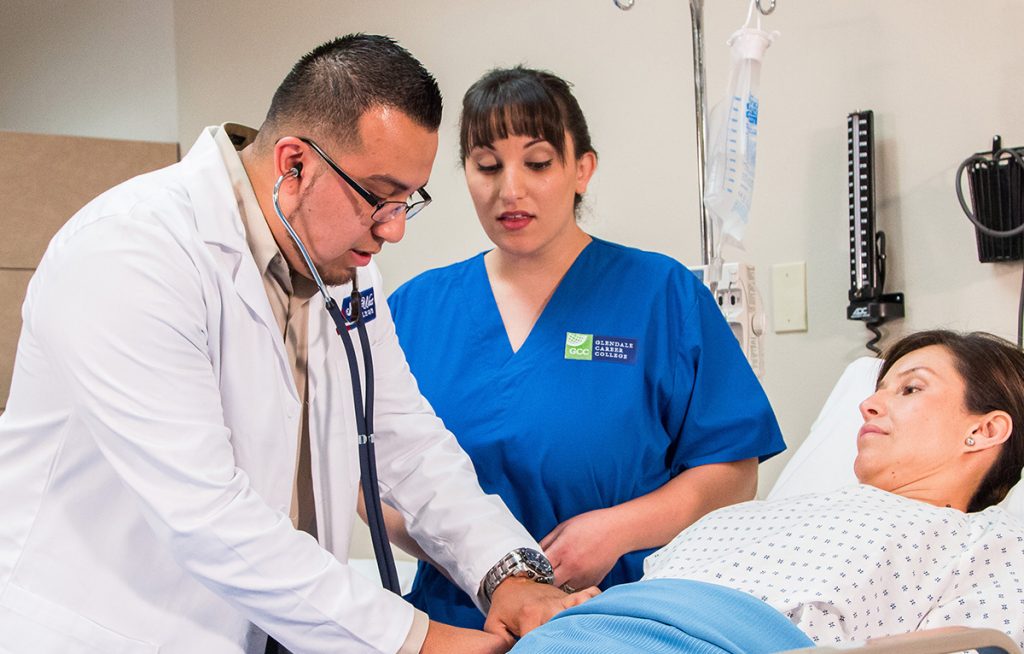
Quick Facts about Vocational Nurses*
Vocational Nurse Course Material
The Vocational Nursing program is separated into a number of class modules and clinical externships where students have the opportunity to apply the skills they learn in the classroom in real health care practice settings.
Seminar for Success
This is an orientation and success building course for Career Students. It includes a review of math, including pharmacological calculations, language, vocabulary, writing, and communication skills. This course also offers an introduction to nutrition and hygiene, professional growth and career development, availability of community resources, outlining, summarizing, critical thinking, and other life skills.
Nursing Fundamentals / Nursing Fundamentals-Clinical
This course provides students with knowledge of basic nursing skills, their principles, and rationale, including communication skills, the nursing process, patient education, gerontological nursing and rehabilitative nursing. It also covers the legal and ethical aspects of nursing care. In addition, students are introduced to basic nutrition using the food pyramid and food groups. Students will also learn basic diets for different medical conditions (cardiac, diabetic, etc.) that will be covered in more detail when those disease processes are taught in Medical/Surgical Nursing. This course looks at the patient as a whole being and underscores treating the person with respect to cultural and ethical differences. Maslow’s theory is utilized as a foundation for understanding human needs. The course also discusses psychological adaptations to illness and various situations as well as care of the patient with a psychological diagnosis in the acute care facility. The growth and development of patients as part of the normal aging process is covered as well. Starting from birth to death, there are certain stages most people pass through, which is relevant to the nursing care plan for each patient.
Anatomy & Physiology
This course gives students knowledge of basic anatomy and physiology of the human body. Students will also study the structure and normal function of each of the body systems and the related pathology with correlation to each system as it is covered in the Medical/Surgical Nursing courses.
Medical-Surgical Nursing 2 / Medical-Surgical Nursing 2-Clinical
This course teaches students about the medical and surgical treatment of the adult. It also covers disorders of the muscular-skeletal, respiratory, lymphatic, immune, and gastrointestinal systems. In addition, students will learn about communicable diseases, pain management, perioperative nursing, and oncology. Students will be introduced to diseases and disorders, treatment, diets, and medications for each system and will develop nursing care plans for assigned patients. In the clinical area, the student will offer direct care to patients, including the administration of medications. The course curriculum also includes ethical problems and behaviors.
Medical-Surgical Nursing 3 / Medical-Surgical Nursing 3-Clinical
The curriculum for this course includes the medical and surgical treatment of the adult. It covers the disorders of the cardiovascular, integumentary, endocrine, reproductive, and renal/genitourinary systems. Students will be introduced to diseases and disorders, treatment, diets, and medications for each system. It also includes a comprehensive review of subjects related to pharmacology, nutrition, as well as anatomy and physiology discussed during Terms 1 and 2. Students will continue to develop concept maps and patient care strategies during the clinical portion of their course, and will also continue to offer hands-on care to patients, including the administration of medications.
Pharmacology
This course covers the basic preparation of medications for administration. The classes and groups of medications along with their actions and uses are discussed throughout the program. The student is expected to know the indications and contraindications of each medication before it is administered along with how to prepare and administer medications safely and accurately. Twenty-four hours of Pharmacology must be completed in Term 1; an additional 30 hours is integrated into Term 2, 3, and 4.
Medical-Surgical Nursing 4 / Medical-Surgical Nursing 4-Clinical
This course curriculum includes the medical and surgical treatment of the adult. It covers the diseases of the neurosensory system. It also goes over professional development and leadership skills, both of which are crucial to becoming a nursing team member, assignment making, reporting at change of shift, and completing other duties expected of a nurse. It covers responsibility for a team of care providers along with one’s own behaviors. As the student prepares to graduate, they will need to develop skills for a job search—this will include a review of resume writing and interviewing with potential employers. Students will prepare for the licensure exam and complete the necessary paperwork. They will also be reminded of the need to review materials before taking the licensure exam.
Maternal Health / Maternal Health-Clinical
Topics covered include prenatal, perinatal, neonatal and postpartum care. The course discusses providing medically appropriate care during pregnancy, and birth, along with the transition through postpartum recovery.
Child Health / Child Health-Clinical
Students will receive a general introduction to the pediatric patient and progresses to specific needs, including diseases and disorders related to each body system. The course also covers the needs of the pediatric patient and how it differs from the adult patient, pediatric medication administration, and psychological needs of the child and the family.
Mental Health / Mental Health-Clinical
This course includes an overview of psychiatric-mental health nursing and mental health disorders, dealing with the needs of victims of abuse, loss, grief, and death, substance abuse, personality, mood and anxiety disorders. It also offers a brief look at crisis intervention and suicide. The Vocational Nurse curriculum also includes Student Orientation and CPR.
Vocational Nurse Course Activities
Graduates of the Vocational Nursing program often find entry-level positions working in medical offices and facilities, including private doctors’ offices, clinics, hospitals, public health organizations, and other health care related organizations.
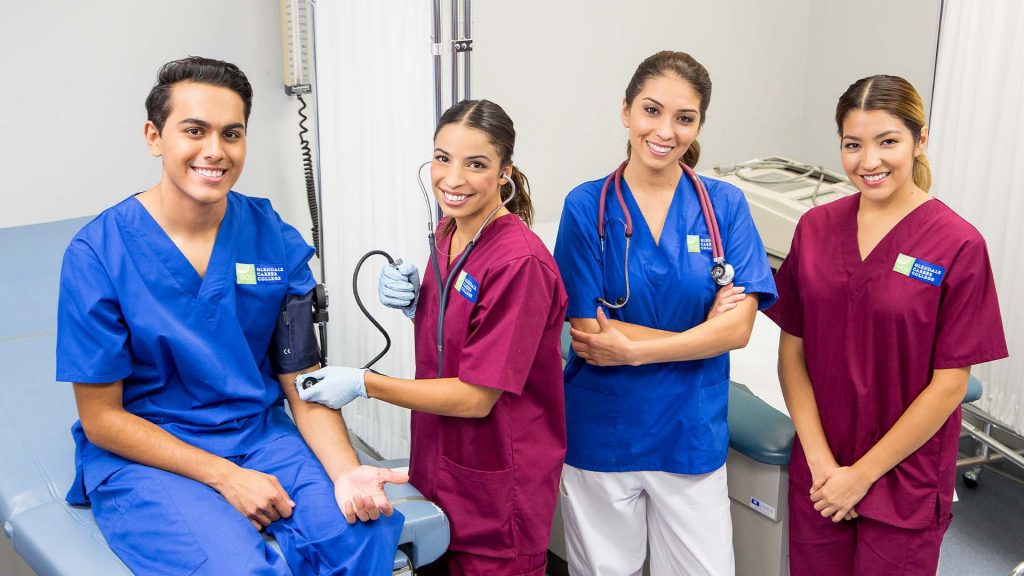
Vocational Nurses typically perform the following tasks:
Request Information
Fill out a short form online and one of our admissions representatives will contact you to answer any questions you have.
Apply Online Now!
Ready to make your decision now? You can apply now online in under a few minutes.
Schedule a Tour
Come and see us in person! Talk to your future instructors, meet your future classmates and get familiar with your new home.
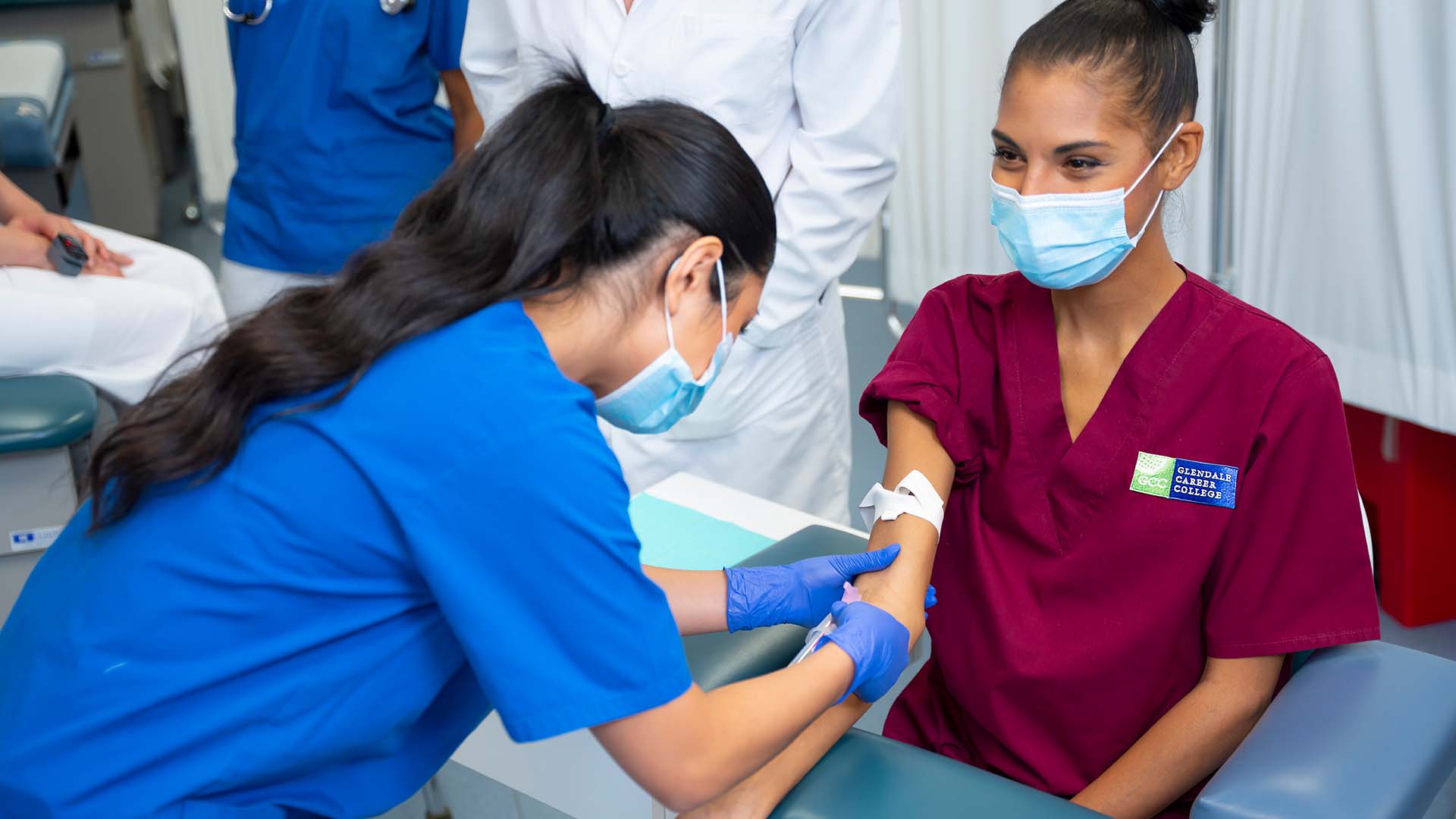
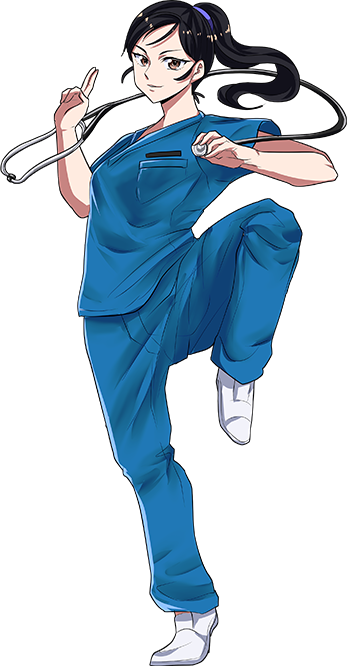
Vocational Nurse Overview
Licensed Vocational Nurses (LVNs) and Licensed Practical Nurses (LPNs) provide hands-on patient care under the direction of a Registered Nurse or a licensed doctor. Vocational Nurses offer individual- and family-centered nursing care, and help determine the basic physical, emotional, spiritual, and sociocultural needs of the patient.
Vocational Nursing professionals work in a number of health care settings, including hospitals, skilled nursing facilities, doctors’ offices, medical clinics, correctional facilities, and home health care agencies.
Vocational Nurses regularly perform a number of crucial tasks, including:
The Vocational Nursing program at Glendale Career College can equip you with the health care knowledge and skills needed to start a career as a Vocational Nurse working in a medical office, clinic, physician’s office, HMO, rehabilitation center, hospital, or other health care facility.
Professional Licensure Disclosure
The Vocational Nurse program at Glendale Career College meets the education requirements for a program of study intended to lead to licensure as a Licensed Vocational Nurse in the State of California.
The State of California requires that an applicant for a Licensed Vocational Nurse professional licensure complete a nursing program that includes 1,530-clock hours at an institution approved by the California Board of Vocational Nursing and Psychiatric Technicians (BVNPT).
Glendale Career College is approved by the California BVNPT and the College’s Vocational Nurse program exceeds the 1,530-clock hour requirement. After successfully completing the College’s Vocational Nurse program, the student must also pass the NCLEX-PN exam offered by the National Council of State Boards of Nursing, Inc. in order to become a Licensed Vocational Nurse.
You can view NCLEX-PN pass rates here:
Glendale Career College has not made a determination as to whether the College’s Vocational Nurse program meets the Licensed Vocational Nurse professional licensure requirements of any other state.
* Bureau of Labor Statistics, U.S. Department of Labor, Occupational Outlook Handbook, Licensed Practical and Licensed Vocational Nurses, found at https://www.bls.gov/ooh/healthcare/licensed-practical-and-licensed-vocational-nurses.htm (visited June 2020).
GCC is not able to guarantee employment.
Proudly accredited, licensed to operate and/or recognized by the following institutions:




Many programs feature Online lectures and classes combined with hands-on in-person lab training.
Enroll in the Vocational Nurse program at the following campuses:
Explore our other nursing and health care career training programs at our campuses in Bakersfield, San Diego and Glendale, California near Los Angeles, Burbank, Hollywood and Pasadena
Meet a Graduate
Questions?
Let us help you launch your career by contacting us today. Simply fill out our contact form or call us at 800-639-3384.
Classes are starting soon!
Vocational Nurse Careers & Work Environment
The Vocational Nursing program at Glendale Career College offers the education and training necessary to start a career working in a number of different medical and health care facilities.
Graduates of the Vocational Nursing program often find entry-level employment opportunities in a number of health care related facilities, including:
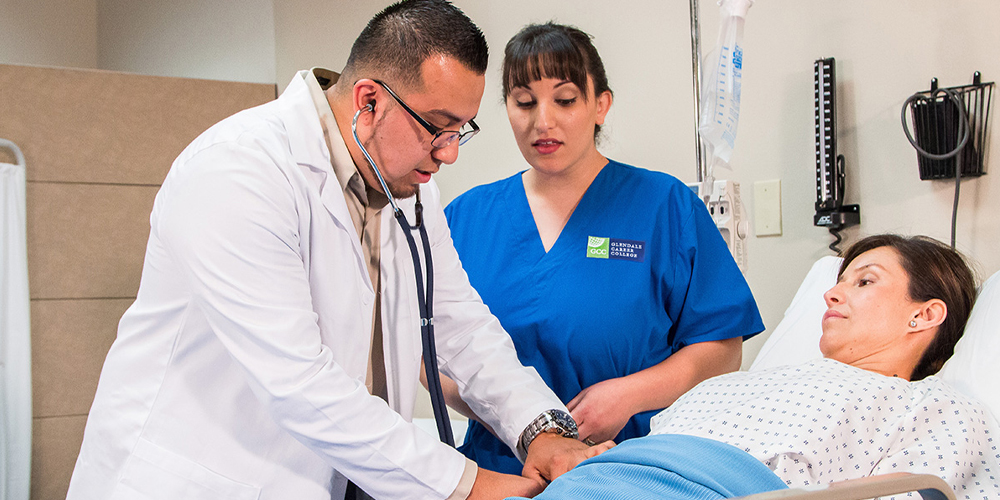
Quick Facts about Vocational Nurses*
Vocational Nurse Course Material
The Vocational Nursing program is separated into a number of class modules and clinical externships where students have the opportunity to apply the skills they learn in the classroom in real health care practice settings.
Seminar for Success
This is an orientation and success building course for Career Students. It includes a review of math, including pharmacological calculations, language, vocabulary, writing, and communication skills. This course also offers an introduction to nutrition and hygiene, professional growth and career development, availability of community resources, outlining, summarizing, critical thinking, and other life skills.
Nursing Fundamentals / Nursing Fundamentals-Clinical
This course provides students with knowledge of basic nursing skills, their principles, and rationale, including communication skills, the nursing process, patient education, gerontological nursing and rehabilitative nursing. It also covers the legal and ethical aspects of nursing care. In addition, students are introduced to basic nutrition using the food pyramid and food groups. Students will also learn basic diets for different medical conditions (cardiac, diabetic, etc.) that will be covered in more detail when those disease processes are taught in Medical/Surgical Nursing. This course looks at the patient as a whole being and underscores treating the person with respect to cultural and ethical differences. Maslow’s theory is utilized as a foundation for understanding human needs. The course also discusses psychological adaptations to illness and various situations as well as care of the patient with a psychological diagnosis in the acute care facility. The growth and development of patients as part of the normal aging process is covered as well. Starting from birth to death, there are certain stages most people pass through, which is relevant to the nursing care plan for each patient.
Anatomy & Physiology
This course gives students knowledge of basic anatomy and physiology of the human body. Students will also study the structure and normal function of each of the body systems and the related pathology with correlation to each system as it is covered in the Medical/Surgical Nursing courses.
Medical-Surgical Nursing 2 / Medical-Surgical Nursing 2-Clinical
This course teaches students about the medical and surgical treatment of the adult. It also covers disorders of the muscular-skeletal, respiratory, lymphatic, immune, and gastrointestinal systems. In addition, students will learn about communicable diseases, pain management, perioperative nursing, and oncology. Students will be introduced to diseases and disorders, treatment, diets, and medications for each system and will develop nursing care plans for assigned patients. In the clinical area, the student will offer direct care to patients, including the administration of medications. The course curriculum also includes ethical problems and behaviors.
Medical-Surgical Nursing 3 / Medical-Surgical Nursing 3-Clinical
The curriculum for this course includes the medical and surgical treatment of the adult. It covers the disorders of the cardiovascular, integumentary, endocrine, reproductive, and renal/genitourinary systems. Students will be introduced to diseases and disorders, treatment, diets, and medications for each system. It also includes a comprehensive review of subjects related to pharmacology, nutrition, as well as anatomy and physiology discussed during Terms 1 and 2. Students will continue to develop concept maps and patient care strategies during the clinical portion of their course, and will also continue to offer hands-on care to patients, including the administration of medications.
Pharmacology
This course covers the basic preparation of medications for administration. The classes and groups of medications along with their actions and uses are discussed throughout the program. The student is expected to know the indications and contraindications of each medication before it is administered along with how to prepare and administer medications safely and accurately. Twenty-four hours of Pharmacology must be completed in Term 1; an additional 30 hours is integrated into Term 2, 3, and 4.
Medical-Surgical Nursing 4 / Medical-Surgical Nursing 4-Clinical
This course curriculum includes the medical and surgical treatment of the adult. It covers the diseases of the neurosensory system. It also goes over professional development and leadership skills, both of which are crucial to becoming a nursing team member, assignment making, reporting at change of shift, and completing other duties expected of a nurse. It covers responsibility for a team of care providers along with one’s own behaviors. As the student prepares to graduate, they will need to develop skills for a job search—this will include a review of resume writing and interviewing with potential employers. Students will prepare for the licensure exam and complete the necessary paperwork. They will also be reminded of the need to review materials before taking the licensure exam.
Maternal Health / Maternal Health-Clinical
Topics covered include prenatal, perinatal, neonatal and postpartum care. The course discusses providing medically appropriate care during pregnancy, and birth, along with the transition through postpartum recovery.
Child Health / Child Health-Clinical
Students will receive a general introduction to the pediatric patient and progresses to specific needs, including diseases and disorders related to each body system. The course also covers the needs of the pediatric patient and how it differs from the adult patient, pediatric medication administration, and psychological needs of the child and the family.
Mental Health / Mental Health-Clinical
This course includes an overview of psychiatric-mental health nursing and mental health disorders, dealing with the needs of victims of abuse, loss, grief, and death, substance abuse, personality, mood and anxiety disorders. It also offers a brief look at crisis intervention and suicide. The Vocational Nurse curriculum also includes Student Orientation and CPR.
Vocational Nurse Course Activities
Graduates of the Vocational Nursing program often find entry-level positions working in medical offices and facilities, including private doctors’ offices, clinics, hospitals, public health organizations, and other health care related organizations.

Vocational Nurses typically perform the following tasks:
Licensed Vocation Nurse (LVN) Courses, Licensed Practical Nurses (LPN) Programs, Vocational Nurse School – Includes Hands-On In-Person Training & Online Lectures – Glendale Career College – With Campuses in Glendale, San Diego, Bakersfield, Burbank, Pasadena, Hollywood, West Covina, Los Angeles (LA) & Other California (CA) Communities
